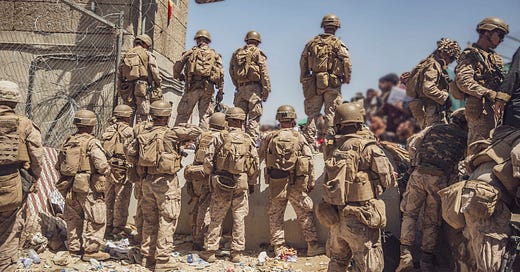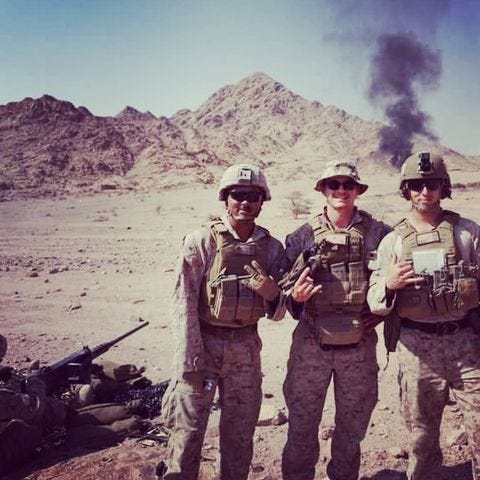The Ghosts of August 26
"They are, and were, not perfect in every regard. But they were to me."
IT WAS AUGUST 26, 2021, and Staff Sgt. Jonathan Eby, a platoon sergeant in charge of several dozen U.S. Marines, was about to walk outside Abbey Gate for the last time.
At that point, the Marines had been in Afghanistan for a week—they were dog tired and dirty—defending a gate alongside a putrid canal at the Hamid Karzai International Airport (HKIA) in Kabul, becoming witnesses to unspeakable horror day in and day out.
“People were being crushed to death,” one Marine recalled to investigators.
Crowds in the thousands had surged outside the airport walls in the days after the Taliban seized the capital city and the Afghan government quickly collapsed. But the Marines and thousands of troops deployed there had nevertheless been given a mission: save as many people as possible before the clock runs out on August 31.
“I remember the constant threat notifications. Knowing that each passing minute added likelihood to incident,” Eby wrote on Instagram earlier this year, recalling a platoon briefing for Ghost 1—the 1st Platoon of Ghost Company, 2nd Battalion, 1st Marine Regiment—before they left the relative safety of HKIA’s walls at around 4 p.m. that day, moved into the crowd, and continued to hold the line for a massive U.S. military operation to exit Afghanistan that would end in the rescue of more than 120,000 people.
“How do you ask men to do that? You don't,” Eby wrote. “You just go and hope they follow. I never had to look back, I knew they were behind me.”
Not long after, an Islamic State terrorist pushed through the crowd and approached the U.S. military checkpoint, detonating a suicide vest that killed an estimated 170 Afghans and 13 American troops. Nine were from Ghost.
“They are, and were, not perfect in every regard,” Eby wrote of them, his platoon of mostly 18 to 20-somethings who called the veteran sergeant ‘dad’ and whom he lovingly referred to as ‘kiddos.’
“But they were to me,” he wrote. “And they mean so much more to their families, friends, and loved ones.”
YOU SHOULD KNOW THE NAMES of the 13 American heroes who died at that gate, trying like hell to save as many lives as possible before that horrific end to a miserable war that had gone on for too long. They were:
Marine Staff Sgt. Darin T. Hoover, 31, of Salt Lake City, Utah
Marine Sgt. Johanny Rosario Pichardo, 25, of Lawrence, Massachusetts
Marine Sgt. Nicole L. Gee, 23, of Sacramento, California
Marine Cpl. Hunter Lopez, 22, of Indio, California
Marine Cpl. Daegan W. Page, 23, of Omaha, Nebraska
Marine Cpl. Humberto A. Sanchez, 22, of Logansport, Indiana
Marine Lance Cpl. David L. Espinoza, 20, of Rio Bravo, Texas
Marine Lance Cpl. Jared M. Schmitz, 20, of St. Charles, Missouri
Marine Lance Cpl. Rylee J. McCollum, 20, of Jackson, Wyoming
Marine Lance Cpl. Dylan R. Merola, 20, of Rancho Cucamonga, California
Marine Lance Cpl. Kareem M. Nikoui, 20, of Norco, California
Navy Hospitalman Maxton W. Soviak, 22, of Berlin Heights, Ohio
Army Staff Sgt. Ryan C. Knauss, 23, of Corryton, Tennessee
These men and women were sons, daughters, sisters, brothers, husbands, and dads who were taken far too soon and are greatly missed. They were the very best of America. And ever since that terrible moment, Eby—the Ghost platoon sergeant—has been revealing their heroism, warmth, and humanity on Instagram at his account @ghost.1b, while preserving many more stories of the fallen and surviving Ghosts of August 26, 2021.
“I started this to remind myself, the Marines of Ghost1, and their families how not forgotten or lost their memory is to me,” Eby wrote “...There is still more you should know. I look forward to sharing it with you.”
THESE ARE a few of those memories that you should know about:
‘You can’t make men like’ Sgt. Jonathan Painter
After being engulfed in flames and receiving shrapnel that went through his helmet and gashed his face, Sgt. Painter, the 3rd squad leader, rallied his squad “through his decisive leadership” and worked side by side with Eby to carry the wounded to safety.
“You can't make men like this. Sgt Painter is, and will forever be, one of my heroes,” Eby wrote.
Lance Cpl. Michael Gretzon took shrapnel to the arm and kept in the fight
Michael Gretzon was bleeding after taking shrapnel to the arm, but according to Eby, the lance corporal “simply switched his weapon to his other hand and got on security, scanning rooftops and barriers deeper for a cameraman or to prepare for a follow-on attack.”
Lance Cpl. Romel Finley’s positivity kept Ghost’s spirits up
The suicide blast knocked Finley from the canal wall onto the ground, sending shrapnel into his hip, leg, and neck and causing temporary paralysis to his face.
“Passion and positivity provided by Finley helped to get us through our time at HKIA,” Eby wrote. “Always smiling, even in the pictures we'd see in the days that followed when we were stuck in Kuwait.”
Lance Cpl. Jordan Houston hid a wound so he wouldn’t be evacuated
Lance Cpl. Jordan Houston was wounded and momentarily knocked unconscious when the bomb went off. When he came to, he evacuated others to the hospital, where he was checked out.
Houston was discharged that night, but days later when he was back with the platoon in Kuwait, he admitted to Eby that something was still wrong.
“He was using band-aids he had to cover a wound in secret, concerned he would be whisked away from the rest of us,” Eby wrote. “He wasn't the only one we found out that did that. No one wanted to leave each other. No one wanted to be anywhere else but with the platoon.”
These stories and photos represent only a small slice of what you can find on Eby’s account, which you can find here.
Thanks for reading,











My Dad told me about many Marines, including himself, who were wounded at Chosin Reservoir in 1950 and didn’t say anything, because they didn’t want to leave their comrades.
Heroes. It's not enough for the President, SECDEF and CJCS to remember them. The President, SECDEF and CJCS need to be held to account for putting the US military in harm's way, unnecessarily.